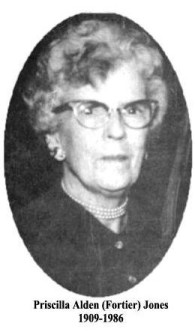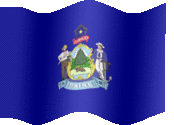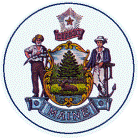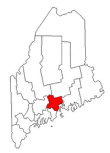Priscilla Jones was a woman who
once you met, you never forgot. She
was proficient in genealogical research.
She was born in Dixfield, Maine, the
daughter of Harry and Elizabeth (Thomas)
Fortier. She married Dr. Richard
Jones in 1929. His practice took
them to Belfast, Maine where they made
their home in the old Pitcher house at 5
Franklin Street with three daughters,
Betty, Mary and Gail.
After the death of her husband
in 1951, Priscilla went to Boston, Mass.
where she worked in an office. While
in Boston she had the misfortune to break
her ankle. While recuperating, she
worked on a genealogy book started by her
mother, which had windows with ancestors’
names. Some of the windows were
empty, so she limped to the Boston Public
Library to research to fill in the holes.
She, like many others, was soon
bitten by the research bug. She
subsequently found that she had
twenty-seven Mayflower ancestors.
When she came back to the
spacious house on Franklin Street, her
research began to fill up the many rooms
with high ceilings with file cabinets
filled with file folders, three-ring
notebooks, as well as filling every nook
and cranny. She likened the research
hunting as compulsive, telling a reporter
in 1979 that the compulsion was likened to
being an alcoholic. Her fame quickly
grew. She received letters, queries
and visitors from near and far. When
a plumber came to repair her water works,
she would ask him his parents,
grandparents, and all he knew about his
family. She later presented him with
a hand-written genealogy of his family.
She was a smoker, and when she was
engrossed in research, the cigarette ash
would grow longer until it dropped.
She loved her cats, and they
sprawled out over the books as she
researched.

|
Priscilla purchased an almost
complete set of the Mayflower
Descendants. She told me that
when she started buying the Mayflower
books and other noted Town and Local
Histories and Genealogies, that they were
“dirt cheap”, which allowed her to build
her collection. When a query came to
her about a person’s ancestry, her keen
mind knew where she had filed it.
She and others made many trips to
the Maine State Library and Museum to copy
old records and Census records. She
gathered her three-ring notebooks from
yard sales, advertising from businesses,
and her grandchildren’s castoffs.
Priscilla said that she preferred
that people did their own research with
her help, which was why she was
hand-copying the local records, all of
this was done before computers. She
did her typing on an old Royal typewriter.
Priscilla’s son-in-law was the
Editor of the local newspaper, The
Republican Journal, which started in
1829. She was allowed to take the
huge bound issues of the newspapers home.
She poured over the pages of the old
newspapers from the beginning, page by
page, hand-copying vital records, which
consisted of births, deaths, marriages,
obituaries and interesting articles onto
file cards. She had file drawers of
the hundreds of file cards. The
local undertaker, Horace Coombs, allowed
her to hand-copy the old funeral records,
which had a wealth of information in them.
She remembered names, dates and
places. She recited the history of
places and families, and was a walking
encyclopedia of local genealogical
information.
Hugh Russell, a prominent
librarian at the Belfast Free Library
fondly called three researchers, Priscilla
Jones, Betsy Mosher and Isabel Morse
Maresh, in a 1988 newspaper article, “The
Big Three.” Priscilla had taught her
compulsion well to the others doing
research. When Priscilla passed away
in 1986, she, like so many other
researchers, had made no provision as to
where her collection would go. Her
daughters donated the collection to the
Penobscot Marine Museum, where researchers
can go and take advantage of her years of
research. She was a member of the
Daughters of the American Revolution, the
Mayflower Society, and submitted articles
to the New England Historical and
Genealogical Society of Newbury Street,
Boston, Mass.
When Priscilla died, her friend,
Isabel Morse Maresh wrote ’An Ode to
Priscilla Jones’, which was published in
the local newspaper, which reads:
“Priscilla’s gone,” the caller said. “This
time she didn’t make it.” Priscilla,
gone! I cannot believe that she is
gone. To know her was to love her.
“I first met Priscilla in 1979
when I was struggling with my Heal-Heald
ancestry. “Come in,” she said, “I
can help you!” Help me, she did.
She pulled out one of her hundreds
of hand-written files and there was the
information on my great-great grandmother.
I didn’t return because I felt that
she was too busy. She phoned one day
and said, “You didn’t come back.”
Thus started a friendship that would
last a lifetime.
“She did not call herself a
genealogist, but rather a ‘genealogical
researcher’. That was so like
her. She was so modest about her
achievements, but generations to come will
glean from her vast storehouse of
knowledge. She and Betsy Mosher
spent hundreds of hours at the Maine State
Archives hand-copying Federal Census
records taken every decade and copied all
of Waldo County from 1800 to 1880, got
them indexed, typed and into libraries.
After meeting her, I, too, helped
with copying Census records.
Priscilla typed the early Northport
records, and copied all of the Vital
Statistics from the early Republican
Journals, until nearly 1892.
Her goal was to do to 1900, but she
got too tired to finish it. [After
her death, I photocopied the vital records
from The Republican Journal up to 1892,
and gave a copy to the Belfast Free
Library.]
“Priscilla did the genealogies
of people who came to her, who wrote to
her, for dignitaries, and for the little
people, most without a charge. She
could remember places and dates that would
boggle a much younger person‘s mind.
“Gone! No, to those who
met her and loved her, she shall never be
gone. We will remember the little
things that she would laugh about.
Like when we went to Augusta to copy
records, she would nod her head, and would
laugh later about the squiggly lines
caused when she fell asleep copying.
“Missed! I shall miss
those spontaneous phone calls, when her
bubbly voice would say, “I’ve missed you!”
She called several days ago to tell
me of the ancestry of a Belmont family
that she felt that I would be interested
in.
“It became a habit to stop in
whenever I was in town. You never knew
what to expect. “How about lunch?”,
so lunch it would be. Or, “How about
a walk?” And to walk with her was to
see the world through her eyes.
Because of her hip operations, the
walks were slow and leisurely. We
saw the beauty of Water Street and
recalled the splendor of early days in
Belfast. We saw beauty in a
brilliant maple tree, holding its leaves
after others had fallen. We walked
around the block at ‘The Cove’, ate wild
blackberries and visited a friend. I
heard of the history of the McClintock
block, which was hailed as the most modern
apartments in Belfast when it was built.
She taught me much about genealogy.
“She had her political opinions,
being a staunch Republican, and opinions
of the daily world. She never
complained, though she had two major hip
operations, and a heart condition.
She did not boast of her
accomplishments or her position in life,
though she had written articles for the
New England Historical and Genealogical
Register, and Mayflower groups.
“Priscilla gone! No, she
has just changed her address as easily as
she gave up her large house on Franklin
Street for an apartment as bright and
cheery as she. I know that when she
stepped through her new address beyond the
Pearly gates, she was greeted by those
loved ones of hers, as well as the
Mayflower group of which she had
twenty-seven ancestors, by lords and
ladies of old Europe as well as the early
settlers of this area, whose names she
knew so well.
“And she will still be taking
her walks around heaven, and now, she
won’t need her cane. When a friend
and fellow researcher passed away last
year, she simply said, “We shall miss
him.”
“We shall miss you, Priscilla,
but to us you will never be gone.
“Enter thou into the Kingdom of
Heaven, thou good and faithful servant.”
|



